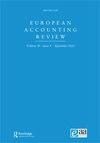Derivatives Disclosures and Stock Price Informativeness
IF 2.7
3区 管理学
Q2 BUSINESS, FINANCE
引用次数: 0
Abstract
AbstractThis study examines the effect of SFAS 161, Disclosures about Derivative Instruments and Hedging Activities, on stock price informativeness. FASB issued SFAS 161, effective in 2008, to provide investors with an enhanced understanding of the objectives and implications of firms’ use of derivatives and hedging activities. Our primary goal is to examine whether SFAS 161 facilitates the dissemination of firm-specific information to the market and thus increases stock price informativeness. Using a U.S. sample covering fiscal-years 2001–2018, this study employs a difference-in-difference research design and identifies the treatment group (derivatives users) by conducting a textual analysis of the firm’s derivatives disclosures in the 10-K reports. The results show that for firms that engage in derivatives activities, stock price informativeness increases after the adoption of SFAS 161. We further find that the positive association between SFAS 161 adoption and stock price informativeness is more pronounced for firms with more readable derivatives disclosures. The results suggest that enhanced readability in derivative disclosures play an important role in reducing the information processing costs for investors.Keywords: SFAS 161Stock price informativenessDerivativesReadability Disclosure statementNo potential conflict of interest was reported by the author(s).Notes1 https://www.bis.org/statistics/about_derivatives_stats.htm?m=26392 The FASB has issued the following statements related to the accounting for derivatives: statements No.52, No.80, No.105, No.107, No.119, No.133, No.138, No.139, No.155, and No.161.3 Under SFAS 133, a derivative may be designated as (i) a fair value hedge, a hedge of the exposure to changes in the fair value of a recognized asset or liability, or of an unrecognized firm commitment; (ii) a cash flow hedge, a hedge of the exposure to variability in the cash flows of a recognized asset or liability, or of a forecasted transaction; or (iii) a foreign currency hedge, a hedge of the foreign currency exposure of an unrecognized firm commitment (foreign currency fair value hedge), available-for-sale security (foreign currency fair value hedge), a forecasted transaction (foreign currency cash flow hedge), or net investment in a foreign operation.4 Using a method similar to that of Guay (Citation1999) and Donohoe (Citation2015), the keyword search flagged all annual reports and searched for specific terms over the fiscal years 2004-2013: forward contract, option contract, futures contract, rate swap, swap agreement, currency exchange contract, foreign exchange contract, derivative instrument, and hedging instrument.5 In Eq. (2), we also exclude current, lagged, and lead value-weighted weekly industry returns of financial sectors for a robustness check.6 We also use the 5-year period before adoption and the 5-year period after adoption for robustness tests. The results remain the same.7 In robustness tests, we include industry fixed effects, and the results remain similar.8 To account for the tax avoidance incentive for using derivatives (Donohoe, Citation2015), we conduct robustness tests. In the tests, we control for tax-related considerations such as a cash effective tax rate, convertible debt, and preferred stock. Furthermore, to address other general incentives for using derivatives, we also include cash flow volatility, earnings volatility, foreign income or loss, and mergers and acquisitions. We also control for the sensitivity of executive compensation to firm value. The results are the same.9 Please refer to the following website for the details of the procedures: https://sraf.nd.edu/data/stage-one-10-x-parse-data/10 The mean of SYNCH for non-users in the post-adoption period is -0.35-0.080 = -0.43. The mean value of SYNCH for users in the post-adoption period is -0.473 ( = -0.43+0.014-0.057). The improvement value is 0.043, which is 10% of the mean value of SYNCH for non-users in the post-adoption period. [0.043/|-0.43|] = 10%衍生品披露与股价信息
摘要本研究考察了《金融衍生工具与套期保值披露》对股票价格信息的影响。FASB发布了SFAS 161,于2008年生效,旨在为投资者提供对公司使用衍生品和对冲活动的目标和影响的更好理解。我们的主要目标是检验SFAS 161是否促进了公司特定信息向市场的传播,从而增加了股价的信息量。本研究使用涵盖2001-2018财年的美国样本,采用差异中差异研究设计,并通过对公司10-K报告中的衍生品披露进行文本分析,确定处理组(衍生品使用者)。结果表明,对于从事衍生品活动的公司而言,采用sas 161后,股价信息含量有所增加。我们进一步发现,对于具有更可读的衍生品披露的公司,采用SFAS 161与股价信息之间的正相关关系更为明显。研究结果表明,提高衍生品信息披露的可读性对降低投资者的信息处理成本具有重要作用。关键词:财务会计准则第161号股价信息衍生品可读性披露声明作者未报告潜在的利益冲突。注1 https://www.bis.org/statistics/about_derivatives_stats.htm?m=26392美国财务会计准则委员会(FASB)发布了以下与衍生工具会计处理相关的声明:第52号、第80号、第105号、第107号、第119号、第133号、第138号、第139号、第155号和第161.3号声明。根据美国财务会计准则第133号,衍生工具可以被指定为(i)公允价值套期,对已确认资产或负债的公允价值变动风险的套期,或对未确认的公司承诺的套期;(ii)现金流量套期,即对已确认资产或负债或预测交易的现金流量变异性风险敞口的套期;或(iii)外币套期保值,对未确认的坚定承诺(外币公允价值套期保值)、可供出售证券(外币公允价值套期保值)、预测交易(外币现金流量套期保值)或对外国经营的净投资的外汇风险敞口的套期保值使用类似于Guay (Citation1999)和Donohoe (Citation2015)的方法,关键词搜索标记了所有年度报告,并搜索了2004-2013财年的特定术语:远期合约、期权合约、期货合约、利率掉期、掉期协议、货币兑换合约、外汇合约、衍生工具和对冲工具在Eq.(2)中,我们还排除了金融部门当前、滞后和领先的价值加权每周行业回报,以进行稳健性检查我们还使用采用前5年和采用后5年进行稳健性测试。结果是一样的在稳健性检验中,我们纳入了行业固定效应,结果仍然相似为了解释使用衍生品的避税动机(Donohoe, Citation2015),我们进行了稳健性测试。在测试中,我们控制了与税收相关的考虑因素,如现金有效税率、可转换债务和优先股。此外,为了解决使用衍生品的其他一般激励因素,我们还包括现金流波动、收益波动、国外收入或损失以及并购。我们还控制了高管薪酬对公司价值的敏感性。结果是一样的有关程序详情,请参阅以下网址:https://sraf.nd.edu/data/stage-one-10-x-parse-data/10非使用者在领养后的时间内,SYNCH的平均值为-0.35-0.080 = -0.43。用户采用后阶段的SYNCH均值为-0.473(= -0.43+0.014-0.057)。改进值为0.043,是采用后阶段非用户同步平均值的10%。[0.043/|-0.43|] = 10%
本文章由计算机程序翻译,如有差异,请以英文原文为准。
求助全文
约1分钟内获得全文
求助全文
来源期刊

European Accounting Review
BUSINESS, FINANCE-
CiteScore
7.00
自引率
6.10%
发文量
58
期刊介绍:
Devoted to the advancement of accounting knowledge, it provides a forum for the publication of high quality accounting research manuscripts. The journal acknowledges its European origins and the distinctive variety of the European accounting research community. Conscious of these origins, European Accounting Review emphasises openness and flexibility, not only regarding the substantive issues of accounting research, but also with respect to paradigms, methodologies and styles of conducting that research. Though European Accounting Review is a truly international journal, it also holds a unique position as it is the only accounting journal to provide a European forum for the reporting of accounting research.
 求助内容:
求助内容: 应助结果提醒方式:
应助结果提醒方式:


